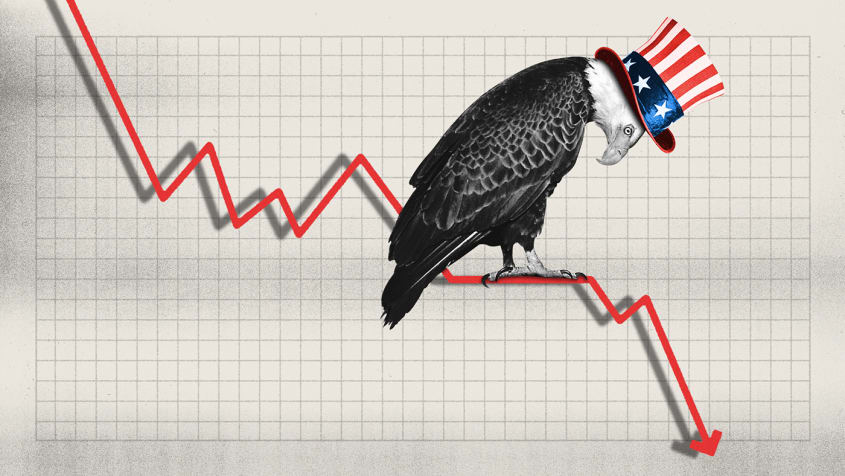大汉奸柳传志
SENIOR MEMBER

- Joined
- Mar 27, 2015
- Messages
- 3,601
- Reaction score
- -24
- Country
- Location
The Wall Street Journal won't say it, but a new poll the outlet released Monday gives a pretty strong indication that Republicans have managed to sully values most Americans once held dear, such as patriotism and religiosity.
The poll, conducted by NORC at the University of Chicago, found cliff-like declines over the past couple of decades in how many Americans describe patriotism and religion as "very important" to them.
While 70% of adults viewed patriotism that way in 1998 and 62% said the same about religion, today, just 38% of respondents called patriotism very important, while 39% said the same about religion.
"These differences are so dramatic, it paints a new and surprising portrait of a changing America,’’ remarked Bill McInturff, a pollster who worked on a previous Journal survey that measured similar attitudes. "Perhaps the toll of our political division, Covid and the lowest economic confidence in decades is having a startling effect on our core values.’’
Uncertainty driven by COVID-19 and the economy has undoubtedly played into a reordering of American values. The poll found that money was the only priority that had grown in importance in the last 25 years—up from 31% in 1998 to 43% now.
Economic uncertainty and the inability of young people to achieve basic milestones, such as getting married and buying a house, have likely also played a role in deemphasizing how people value parenting. Having children fell from 59% of adults calling it "very important" in 1998 to half as many—30%—saying that now.
But Republicans using religion and patriotism as a political cudgel to target and divide Americans over the past couple of decades has also likely taken a toll on values most Americans viewed favorably several decades ago.
“For me, patriotism has turned into right-wing nationalism,’’ said Janet Boyer, a former Pentecostal minister who lives in Southwestern Pennsylvania coal country. Boyer backed President Biden in 2020.
Indeed, the yawning gap between how young Americans and older Americans view patriotism shows a deep erosion over the past quarter-century in embrace of the term, with just 23% of adults under 30 today saying patriotism is very important to them personally, while 59% of their 65-plus counterparts call it very important.
The poll found a similar, if less pronounced, divide between younger and older adults’ views of religion today, with 31% of sub-30 voters viewing religion as very important compared to 55% of 65-plus voters.
Just 23% of adults under age 30 said that having children was very important.
Republican-held positions also polled in the minority on a handful of values-related questions concerning transgender, lesbian, gay, and bisexual Americans, gender equality, and businesses and schools promoting racial and ethnic diversity.

 news.yahoo.com
news.yahoo.com

The poll, conducted by NORC at the University of Chicago, found cliff-like declines over the past couple of decades in how many Americans describe patriotism and religion as "very important" to them.
While 70% of adults viewed patriotism that way in 1998 and 62% said the same about religion, today, just 38% of respondents called patriotism very important, while 39% said the same about religion.
"These differences are so dramatic, it paints a new and surprising portrait of a changing America,’’ remarked Bill McInturff, a pollster who worked on a previous Journal survey that measured similar attitudes. "Perhaps the toll of our political division, Covid and the lowest economic confidence in decades is having a startling effect on our core values.’’
Uncertainty driven by COVID-19 and the economy has undoubtedly played into a reordering of American values. The poll found that money was the only priority that had grown in importance in the last 25 years—up from 31% in 1998 to 43% now.
Economic uncertainty and the inability of young people to achieve basic milestones, such as getting married and buying a house, have likely also played a role in deemphasizing how people value parenting. Having children fell from 59% of adults calling it "very important" in 1998 to half as many—30%—saying that now.
But Republicans using religion and patriotism as a political cudgel to target and divide Americans over the past couple of decades has also likely taken a toll on values most Americans viewed favorably several decades ago.
“For me, patriotism has turned into right-wing nationalism,’’ said Janet Boyer, a former Pentecostal minister who lives in Southwestern Pennsylvania coal country. Boyer backed President Biden in 2020.
Indeed, the yawning gap between how young Americans and older Americans view patriotism shows a deep erosion over the past quarter-century in embrace of the term, with just 23% of adults under 30 today saying patriotism is very important to them personally, while 59% of their 65-plus counterparts call it very important.
The poll found a similar, if less pronounced, divide between younger and older adults’ views of religion today, with 31% of sub-30 voters viewing religion as very important compared to 55% of 65-plus voters.
Just 23% of adults under age 30 said that having children was very important.
Republican-held positions also polled in the minority on a handful of values-related questions concerning transgender, lesbian, gay, and bisexual Americans, gender equality, and businesses and schools promoting racial and ethnic diversity.
What a patriotism poll says about America's changing values
Is there really a major drop in U.S. patriotism? Does it matter?

Poll finds steep declines in how Americans value patriotism, religion, parenting
The Wall Street Journal won't say it, but a new poll the outlet released Monday gives a pretty strong indication that Republicans have managed to sully values most Americans once held dear, such as patriotism and religiosity. The poll, conducted by...
www.dailykos.com






